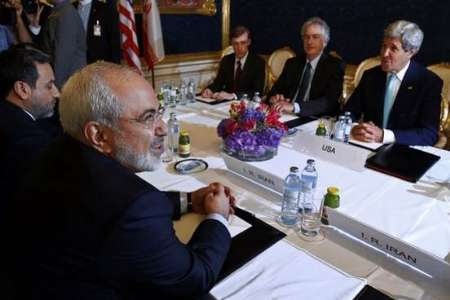Iran’s Achievements in Vienna

-Those who oppose the trend of Iran-P5+1 negotiations and consider them against the national interests of our country should look at Iran in recent years and see where we were and where we have are now.
-Iran’s nuclear negotiating team signed the Geneva Agreement and extended it last Friday under conditions that we are all well aware of; conditions that caused the system to realize the necessity of reaching an agreement.
-Therefore, this agreement was reached so that these conditions, caused by the threats and sanctions and also the foreign policy deadlock which were the result of the implementation of eight years of wrong policies particularly in international relations, would change.
-During the past eight years, Iran was faced with numerous difficulties; the imposition of sanctions, blockage of Iran’s oil incomes, military threats, attempts to isolate the Islamic Republic of Iran in the international scene, etc. A part of these unfair conditions was caused by the imprudent policies of the previous administration.
-The sanctions which were imposed against Iran following the policies pursued in confrontation with the international system were sometimes even unrelated to Iran’s nuclear program. For example, computer software and hardware including anti-virus software were also on the list of sanctions.
-Thus, if negotiations had started from another point, the conditions would have been different and the negotiators could have created another atmosphere and have had more power to maneuver.
-The trend which Iran’s nuclear negotiations with the P5+1 has pursued is a logical and defendable trend.
-Both sides succeeded in reaching a temporary agreement so that this agreement would be an introduction for a comprehensive one.
-Both Iran and the P5+1 have fulfilled their commitments based on the Joint Plan of Action and this has satisfied both parties.
-Contrary to the claims of the critics, in the agreement reached by Iran and the P5+1, nothing has been imposed on the Islamic Republic of Iran and Iran did not lose anything.
-The increasing supervisions and inspections of the IAEA of Iran’s nuclear activities, which Iran has always reiterated are peaceful and where there is no deviation since nuclear arms have no place in Iran’s defense doctrine, are not matters of concern or imposed on Iran.
-On the other hand, the halting of Iran’s 20% enrichment is a temporary and short-term halt for transparency and removing international concerns with regard to Iran’s nuclear program. Iran is not supposed to halt its 20% enrichment forever and on this basis whenever it feels that these concerns are removed, then it can restart this program.
-This is while, at the present time, Iran does not need more than 20% enrichment because first the only place that this amount of enrichment is used is in the Tehran research reactor, which has medical and pharmaceutical uses, and as of now there are enough resources for that.
-Stating that Iran has lost everything and gained nothing in Geneva and Vienna could be right if, during these 17 days of negotiations, an agreement had been reached wherein Iran’s demands were not considered, including the issue of sanctions, enrichment and the continuation of the task of nuclear installations.
-In Vienna, Iran’s nuclear negotiating team stood fast on the achievement of the country’s national interests and did not back down from providing Iran’s needs including the enrichment capacity and the number of centrifuges.
-Since Iran’s needs and demands were not provided, negotiations were preferred to be postponed for more bargaining so that they could be provided.
-One of the important issues for Iran in this round of negotiations was the fate of the sanctions imposed by the US.
-About 70% of the unilateral sanctions which are imposed against Iran by the US are adopted by the Congress and their lifting must somehow be approved by the Congress as well. On this ground, the Islamic Republic of Iran demanded the lifting of sanctions in an agreement about which the White House cannot decide by itself alone.
-Therefore, Mr. Zarif has asked Mr. Kerry to talk with the Congress and the White House officials to know how these sanctions and under what timetable they will be lifted in case a comprehensive agreement is signed.
-Thus, this indicates the accuracy of Iran’s nuclear negotiating team where, even though they look to reach an agreement and resolve the nuclear issue and lift the sanctions against Iran, they are not prepared to reach this agreement under any conditions, in any form and without receiving the necessary guarantees.
-Iran’s demand with regard to the number of centrifuges had the same conditions. Iran had stated that although its present needs for enrichment are clear, based on its increasing need for the future, it is necessary that the number of centrifuges increase and reach 190000 SWUs.
-What Iran must do during the next four months is the oxidation of 25 kilograms of reserved 20% uranium which, although it has not become a commitment for Iran, it was among Iran’s tasks from before so that through this method the fuel rods of the Tehran research reactor would be provided. Therefore, Iran’s measure is not a considerable measure.

